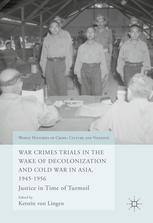

Most ebook files are in PDF format, so you can easily read them using various software such as Foxit Reader or directly on the Google Chrome browser.
Some ebook files are released by publishers in other formats such as .awz, .mobi, .epub, .fb2, etc. You may need to install specific software to read these formats on mobile/PC, such as Calibre.
Please read the tutorial at this link: https://ebookbell.com/faq
We offer FREE conversion to the popular formats you request; however, this may take some time. Therefore, right after payment, please email us, and we will try to provide the service as quickly as possible.
For some exceptional file formats or broken links (if any), please refrain from opening any disputes. Instead, email us first, and we will try to assist within a maximum of 6 hours.
EbookBell Team

0.0
0 reviewsThis book investigates the political context and intentions behind the trialling of Japanese war criminals in the wake of World War Two. After the Second World War in Asia, the victorious Allies placed around 5,700 Japanese on trial for war crimes. Ostensibly crafted to bring perpetrators to justice, the trials intersected in complex ways with the great issues of the day. They were meant to finish off the business of World War Two and to consolidate United States hegemony over Japan in the Pacific, but they lost impetus as Japan morphed into an ally of the West in the Cold War. Embattled colonial powers used the trials to bolster their authority against nationalist revolutionaries, but they found the principles of international humanitarian law were sharply at odds with the inequalities embodied in colonialism. Within nationalist movements, local enmities often overshadowed the reckoning with Japan. And hovering over the trials was the critical question: just what was justice for the Japanese in a world where all sides had committed atrocities?